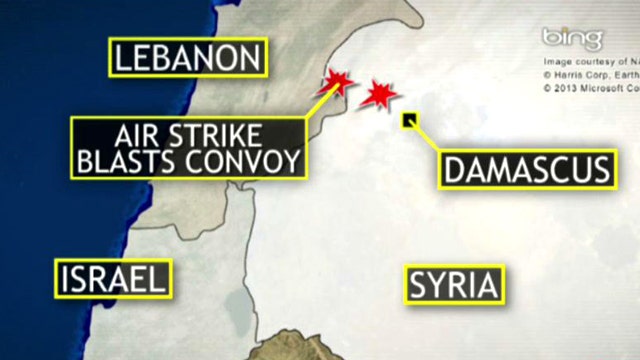Israeli strike on convoy in Syria confirmed by US officials
Conor Powell reports from Jerusalem
Israel launched an airstrike inside Syria overnight near the border with Lebanon, according to U.S. and regional officials.
The regional officials said Israel had been planning in the days leading up to the airstrike to hit a convoy of trucks shipping weapons bound for the Islamist militant group Hezbollah in Lebanon. They said the shipment included sophisticated, Russian-made SA-17 anti-aircraft missiles, which would be strategically "game-changing" in the hands of Hezbollah.
A U.S. official confirmed the strike, saying it hit a convoy of trucks.
Hezbollah on Thursday condemned the raid, saying it targeted a "scientific research center."
In a statement the group said it "expresses full solidarity with Syria's command, army and people," and called the strike "barbaric aggression".
Hezbollah has committed to Israel's destruction and has gone to war against the Jewish state in the past.
The Israeli military declined to comment, and all the officials spoke on condition of anonymity because they were not authorized to discuss the strike.
In another incident, Syrian state TV said an airstrike hit a military research center northwest of the capital, Damascus in Jamraya. It said the strike caused material damage and the center was used to advance Syrian military capabilities.
Well-placed sources in Israel tells Fox News that the Free Syrian Army has claimed responsibility for attacking -- twice over the last week -- what is believed to be the same facility.
These sources believe that the rebels attacked the facility and that the Assad government is claiming that the Israelis executed the strike to garner public support for the government by conflating the rebels with international conspirators, as the government has sought to do since the onset of the revolution.
Sources say the facility is indeed believed to be related to the development of chemical weapons and was attacked for that reason.
A statement from Syria's military said the center was responsible for "raising the level of resistance and self-defense" of its armed forces. It said the strike destroyed the center and a nearby building, killing two workers and wounding five others.
The location and strike could not be independently confirmed because of reporting restrictions in Syria.
Top Israeli officials have recently expressed worries that if desperate, the regime of President Bashar Assad could pass chemical weapons to Hezbollah or other militant groups. U.S. officials say they are tracking Syria's chemical weapons and that they still appear to be solidly under regime control.
Among Israeli security officials' chief fears is that Hezbollah could get its hands on Syrian chemical arms and SA-17 anti-aircraft missiles. If that were to happen, it would change the balance of power in the region and greatly hinder Israel's ability to conduct air sorties in Lebanon.
Israel suspects that Damascus obtained a battery of SA-17s from Russia after an alleged Israeli airstrike in 2007 that destroyed an unfinished Syrian nuclear reactor.
Earlier this week, Israel moved a battery of its new "Iron Dome" rocket defense system to the northern city of Haifa, which was battered by Hezbollah rocket fire in the 2006 Israel-Hezbollah war. The Israeli army called that move "routine."
The military in Lebanon, which shares borders with both Israel and Syria, said Wednesday that Israeli warplanes have sharply increased their activity over Lebanon in the past week, including at least 12 sorties in less than 24 hours in the country's south.
A senior Lebanese security official said there were no Israeli airstrikes inside Lebanese territory. Asked whether it could have been along the border on the Syrian side, he said that that could not be confirmed as it was out of his area of operations.
He spoke on condition of anonymity because he was not authorized to speak to the media.
A Lebanese army statement said the last of the sorties took place at 2 a.m. local time Wednesday. It said four warplanes which flew in over the southernmost coastal town of Naqoura hovered for several hours over villages in southern Lebanon before leaving Lebanese airspace.
It said similar flights by eight other warplanes were conducted Tuesday.
A Lebanese security official said the flights were part of "increased activity" in the past week but did not elaborate. He spoke on condition of anonymity because he was not authorized to brief the media.
The area of Lebanon where the flights took place borders southern Syria.
Israeli violations of Lebanese airspace are not uncommon and Lebanese authorities routinely lodge complaints at the U.N. against the flights.
Fox News' James Rosen, Jennifer Griffin, Justin Fishel and The Associated Press contributed to this report.

